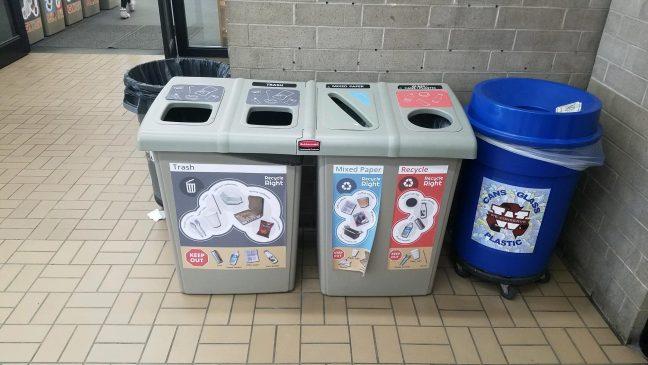Plastic straws, plastic cutlery and paper coffee cups are three common things that can’t be recycled — but often are put in recycling bins.
A new program at the University of Wisconsin’s College Library is trying to change that.
A nearly year-long collaboration between the Campus Office of Sustainability, College Library, Professor Bret Shaw’s senior Life Science Communications capstone class and graduate design student Brooke Weiland has recently come to fruition.
Students who have spent time at College Library in recent weeks might have noticed signage for a new recycling campaign called #RecycleRight.
New table tents at the library will rotate, with each rotation breaking down a common misconception about what can and can’t be recycled. The pervasiveness of this campaign makes it unique, Shaw said, and hopes are high for purifying the library’s waste stream.
The library, a favorite study spot for many campus-goers, is frequently packed with students. That, combined with the library’s permissive attitude about bringing in and ordering food, can result in a lot of waste production, Carrie Kruse, director of College Library, said.
The problem arises when the waste streams are contaminated, Nathan Jandl, the Communications Director for Madison’s Office of Sustainability, said, and #RecycleRight is aimed at educating students on how to avoid it.
“Recycling is not the answer in the final sense,” Jandl said. “However, it is an important tool.”
Shaw has done several environmental behavior change campaigns with his senior capstone classes over the years. He believes this one might end up being the most successful one thus far.
Shaw worked closely with Jandl and Kruse to coordinate the implementation of #RecycleRight.
He had his capstone class performs observational research, qualitative interviews and quantitative surveys at College Library to figure out how people behaved with and thought about recycling and waste.
The students’ research reflected that many students, when unsure whether something is recyclable or not, performed something called “aspirational recycling.”
“It’s widespread that people tend to put things in the wrong place with the best intentions,” Jandl said. “It’s a great impulse, but it’s not the correct impulse, because there are too many non-recyclable items going in recycling.”
Jandl said the sophisticated sorting machinery that recycling plants employ still isn’t enough to keep smaller things like plastic straws and cutlery out of the recycling stream.
Oftentimes, entire loads of recycling need to be thrown in the landfill because of contamination. If there is too much trash in the stream, it isn’t worth it to spend time fishing out the recyclable items, Shaw said.
With this issue in mind, Shaw’s students formed research reports around their discoveries. They then were split into competitive teams with the goal of pitching the best campaign to their client, College Library, to reduce waste stream contamination.
“People want to recycle, and they want to get it right, but there are common mistakes that we should fix,” Kruse said.
While confined to College Library, the campaign is part of a larger approach that the country is taking to purify its waste stream.
The recycling market has become tenuous for the U.S. since China has begun to refuse to refine materials from the U.S. due to high levels of contamination, according to Slate.
On campus, work has been done at other locations to implement more sustainable practices. Shaw has worked with Union South to improve waste management in the past and the building has recently begun to compost along with a few of the university’s dining halls.
It’s a hope for the future that composting becomes more common on campus, and the #RecycleRight campaign is a good start on getting students to be more mindful about their waste, Jandl said.
Shaw emphasized the campaign is ongoing because he does not want to overload students with all of the information at once.
“Waste contamination is one of the impediments to a fully-functioning recycling system,” Jandl said. “It takes work. We’re trying to make it as easy as possible.”


